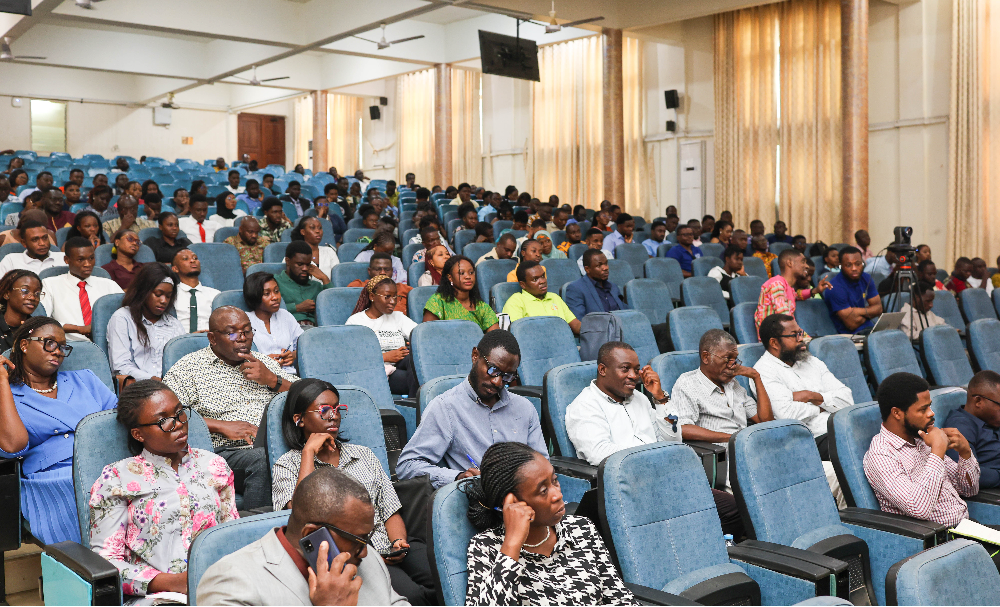The Kwame Nkrumah University of Science and Technology (KNUST), Kumasi, has hosted the 21st Ghana Chemical Society Conference to foster collaborations and find solutions to Ghana’s challenges, particularly in creating a more sustainable environment through science and policy.
The conference under the theme “Chemistry for a Sustainable Future: Innovations for Environment, Agriculture, Clean Energy, and Public Health.” provided a platform for knowledge exchange, professional development and networking among academics and industry leaders
It aimed to inspire a shift in chemical education and practice towards sustainability, drive innovation in key sectors including energy, agriculture and health, and build a stronger community of chemists committed to national and global sustainability goals.
Professor Stephen Ojwach, Associate Professor of Inorganic Chemistry at the University of KwaZulu-Natal in South Africa, urged participants to focus on developing affordable and effective drugs to treat cancers.
“One of the major problems is the cost of treatment, so it is very necessary to come up with drugs that are effective to cure a wide range of cancers. We are developing drugs which could be better than the ones in the market and one that can work on several people,” he said.
The conference featured a panel discussion where speakers stressed the importance of strengthening chemical societies in Ghana.
“The Ghana Chemical Association should have a voice. We must be very strong as a professional body, and everyone should be prepared to sacrifice something for the association,” said Professor Johannes Akpabla Mawuli Awudza of KNUST’s Department of Chemistry.
Professor James Darkwa of the University of Johannesburg added: “One of the key roles of the association is the continuous development of its members. The association should keep people abreast of the times.”
Professor Obinna Ofoegbu of Joseph Sarwuan Tarka University in Nigeria urged for the establishment of an Institute of Chartered Chemists in Ghana, saying professional regulation was key to safeguarding lives.
“I want to be here by next year, and you have an Institute of Chartered Chemists Association of Ghana. Today in Nigeria, if you are importing chemicals into Nigeria, a chartered chemist must sign. I want you to know how powerful you are, but you are not using your powers. I want you to maximise your potential,” he said.
He explained that chemists in Nigeria are licensed, with every chemical dispensing shop required to be covered by a chartered chemist, just as pharmacists oversee patent medicine shops.
Professor Donald E. Elmore of the Department of Chemistry and Biochemistry at Wellesley College, United States, advised participants to use Artificial Intelligence responsibly in their academic work.
“AI can alter the meaning of what you were planning to write. The writing process is a critical part of data analysis and interpretation; however, overreliance on AI restricts this part of the process,” he said.
He stressed the need for the next generation of scientists to master writing skills. “Our current students represent the future of scientific research and advancement. Writing would help them to communicate their ideas to other scientists and to the broader community.”
Mr. Emmanuel Kwasi Debrah, Assistant Registrar and Head of Digital Communications at the University Relations Office, underscored the need for journalists to better understand scientific terminology to communicate it effectively to the public.
He also urged scientists to avoid gatekeeping their research. “As journalists, association means causality, but to the scientist, association does not mean causality,” he said. “It is a problem for scientists to send us their work for us to publish.”
Other speakers also emphasised the importance of science communication.
“For all the scientists, we should create an awareness that scientific communication is important. The language we, the scientists, use should be understandable to society,” said Professor Darkwa.
Professor Godfred Darko added: “Just a few people in Ghana have been trained for proper science writing. The challenge is the equivalence of the terminologies.”

















